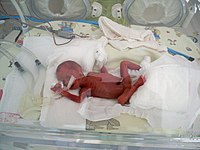
Photo from wikipedia
Background: There is limited evidence about the influence of human milk feeding on short-term outcomes in a large preterm infant population. Research Aims: To explore the influences of human milk… Click to show full abstract
Background: There is limited evidence about the influence of human milk feeding on short-term outcomes in a large preterm infant population. Research Aims: To explore the influences of human milk feeding on the primary outcome of necrotizing enterocolitis and secondarily sepsis, bronchial pulmonary dysplasia, severe retinopathy of prematurity, death, and the time to achieve full enteral feeding at discharge in very/extremely low-birth-weight infants. Methods: This study was a retrospective, longitudinal, observational two-group comparison cohort study. A total of 4470 very/extremely low-birth-weight infants from 25 neonatal intensive care units in China, between April 2015 and May 2018, were enrolled in this study. Exclusive human milk-fed and formula-fed participants were matched using propensity scores. After matching, human milk-fed participants (n = 1379) and formula-fed participants (n = 1378) were included in the analyses. The likelihood of necrotizing enterocolitis, bronchopulmonary dysplasia, sepsis, severe retinopathy of prematurity, death, and the time to achieve full enteral feeding were compared between the two groups. Results: Exclusive human milk feeding was associated with lower odds of necrotizing enterocolitis (2.90% vs. 8.42%, OR 0.33, 95% CI [0.22, 0.47]), bronchopulmonary dysplasia (15.74% vs. 20.26%, OR 0.69, 95% CI [0.56, 0.86]), severe retinopathy of prematurity (1.45% vs. 2.39%, OR 0.50, 95% CI [0.27, 0.93]), and death (6.02% vs. 10.38%, OR 0.44, 95% CI [0.32, 0.61]) compared with formula feeding. No significant differences in the time to achieve full enteral feeding or the odds of sepsis were found between the two groups. Conclusion: Exclusive human milk feeding is associated with a reduction in necrotizing enterocolitis, bronchopulmonary dysplasia, severe retinopathy of prematurity, and mortality among very/extremely low-birth-weight infants. Trial registration: Clinicaltrials.gov on November 9, 2015 (NCT02600195).
Journal Title: Journal of Human Lactation
Year Published: 2022
Link to full text (if available)
Share on Social Media: Sign Up to like & get
recommendations!